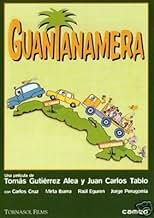Aggiungi una trama nella tua linguaIt is a satire about life in Cuba. The members of a funeral procession and some truck drivers who need to take the same route begin to talk about God and the world and they end up discoverin... Leggi tuttoIt is a satire about life in Cuba. The members of a funeral procession and some truck drivers who need to take the same route begin to talk about God and the world and they end up discovering that life for both groups has many similarities and many differences, depending on the p... Leggi tuttoIt is a satire about life in Cuba. The members of a funeral procession and some truck drivers who need to take the same route begin to talk about God and the world and they end up discovering that life for both groups has many similarities and many differences, depending on the point of view.
























